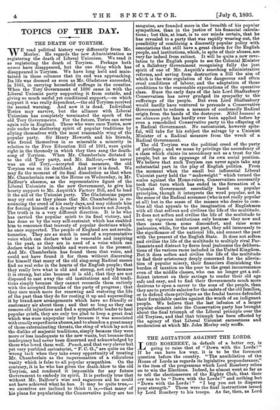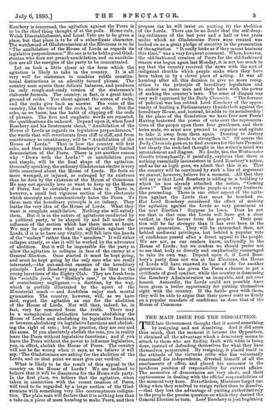THE AGITATION AGAINST THE LORDS.
TORD ROSEBERY, in default of a better cry, is 4 going to raise that of " Down with the Lords ! " If he can have his way, it is to be the foremost question before the country. " The annihilation of the House of Lords as regards its legislative preponderance," is the item of the programme which Lord Rosebery relies on to win the Elections. Indeed, he almost went so far as to tell the electioneerers of the Eighty Club, that their cry was to be " Down with the Lords !" and nothing but " Down with the Lords ! " "I beg you not to disperse your strength." Those were the final instructions issued by Lord Rosebery to his troops. As far, then, as Lord Rosebery is concerned, the agitation against the Peers is to be the chief thing thought of at the polls. Home-rule, Welsh Disestablishment, and Local Veto are to be given a place, but that place is to be of a subordinate character. The watchword of Gladstonianism at the Elections is to be " The annihilation of the House of Lords as regards its legislative preponderance." No one is to be held a good Glad- stonian who does not preach annihilation, and on annihila- tion are all the energies of the party to be concentrated.
Let us look a little closer at the form which the agitation is likely to take in the country. It is all very well for statesmen to combine subtle constitu- tional distinctions in an adroitly turned phrase. The country soon upsets these delicate balances, and produces its only rough-and-ready version of the statesman's elaborate formula. The country, in fact, is a great back- ground of rocks. You shout against the screen of rocks, and the rocks give back an answer. The voice of the country, like the voice of the rocks, is an echo. But the echo, as we know, has the habit of clipping off the ends of phrases. The first and emphatic words are repeated, the qualifications die unheard. Depend upon it, when Lord Rosebery and his lieutenants shout, " Annihilation of the House of Lords as regards its legislative preponderance," the words that will reverberate from cliff to cliff, and from constituency to constituency, will be "Annihilation of the House of Lords." That is how the country will first echo, and then interpret, Lord Rosebery's artfully limited denunciation of the Peers. There is yet another reason why " Down with the Lords ! " or annihilation pure and simple, will be the final shape of the agitation. Generally speaking, the ordinary Gladstonian elector is very little concerned about the House of Lords. He feels no more wronged, or injured, or outraged by its existence than he does by the existence of the House of Commons. He may not specially love or want to keep up the House of Peers, but he certainly does not hate it. There is, however, a small but vigorous section of the electorate which sincerely and conscientiously hates the Peers. To these men the hereditary principle is an infamy. They loathe the very idea of the House of Lords. What they want is complete annihilation. Nothing else will satisfy them. But it is in the nature of agitations conducted by a political party, to be shaped by and fall under the influence of the section which has them most at heart. We may be quite sure that an agitation against the Lords, if it is to have any vitality, will fall into the hands of the " enders " rather than the " menders." It will either collapse utterly, or else it will be worked by the advocates of abolition. But it will be impossible for the party to allow the agitation to collapse in face of the enemy at a General Election. Once started it must be kept going, and must be kept going by the only men who are really interested,—the out-and-out enemies of the hereditary principle. Lord Rosebery may refine as he likes to the young barristers of the Eighty Club. They are fresh from the "scintilla juris," or " Shelley's case," or the doctrine of contributory negligence — a doctrine, by the way, which is prettily illustrated by the upset of the Ministerial coach — and doubtless enjoy such mental gymnastics. The country, however, will, as we have said, regard the agitation as one for the abolition of the House of Lords. Nor will they, indeed, be, in fact, very far removed from the truth. There may be a metaphysical distinction between abolishing the House of Lords and abolishing its legislative functions, or between abolishing its legislative functions and abolish- ing the right of veto ; but, in practice, they are one and the same. If you absolutely abolish the veto, you in reality leave the Peers without legislative functions ; and if you leave the Peers without the power to influence legislation, you, in effect, abolish the House of Peers. The country will not be far wrong when it says, as we believe it will say, ' The Gladstonians are asking for the abolition of the Lords, and on that point we must give our verdict.'
What is likely to be the result of this appeal to the country on the House of Lords ? We are inclined to believe that it will be disastrous for the Home-rule party. In the first place, we believe that the agitation, when taken in connection with the recent creation of Peers, will tend to be regarded by a large section of the Glad- stonians with something very like contemptuous indigna- tion. The plain man will declare that it is nothing less than a take-in, a. piece of mere humbug to make Peers, and then propose (as he will insist on putting it) the abolition of the Lords. There can be no doubt that the self-deny- ing ordinance of the last year and a half or two years under which no Gladstonian Peers were created was looked on as a great pledge of sincerity in the prosecution of the agitation. " It really looks as if they meant business this time," was a very frequent comment. When, however, the old-fashioned creation of Peers for the old-fashioned reason was begun again last Monday, it is not too much to say that the country received the news with the sort of indignant chuckle which people make when they have been taken in by a clever piece of acting. It was all humbug after all, this decision to give no more recog- nition to the principle of hereditary legislation and to endow no more men and their heirs with the power of making the country's laws. The sense of disgust was very well expressed by the Daily Chronicle. "The fortune of political war has robbed Lord Rosebery of the oppor- tunity of hurling a Parliamentary thunderbolt against the hereditary House, and, instead, he adds to its membership ! In the place of the Resolution we have four new Peers ! Having bestowed the power of veto over the representa- tives of the people upon these four gentlemen and their heirs male, we must now proceed to organise and agitate to take it away from them again. Desiring to destroy an institution we decide to strengthen it." Of course the Daily Chronicle goes on to find excuses for the late Premier; but clearly the rock-bed thought in the writer's mind was astonishment and disgust. No doubt, too, the Westminster Gazette triumphantly, if painfully, explains that there is nothing essentially inconsistent in Lord Rosebery's action, and as far as logic goes, we admit that this is so. That the country will be convinced by such a line of argument we cannot, however, believe for a moment. All that they will say is that Lord Rosebery is adding to a building to which he has already attached the notice, "Coming down !" That will not strike people as a very business- like proceeding. There is one other aspect of the agita- tion against the Lords that must be touched on. Has Lord Rosebery considered the effect of making the agitation against the Lords so very prominent at the next Election ? Suppose he loses. Does he not see that in that case the Lords will have got a clear verdict in their favour from the people ? Their posi- tion will be far stronger than it has ever been in the present generation. They will be entrenched then, not behind mediaeval privileges, but behind a popular vote of confidence passed after a direct appeal to the people. We are not, as our readers know, unfriendly to the House of Lords ; but we confess we should prefer not to see that body so directly and emphatically encouraged to take its own way. Depend upon it, if Lord Rose- bery's party does not win at the Elections, the House of Lords will have renewed its lease of life for another generation. He has given the Peers a chance to get a certificate of good conduct, while the country is dismissing the Rosebery Administration as incapable, and not over honest. Assuredly, the Lords could not possibly have been given a better opportunity for putting themselves right with the country. If the battle goes with them, they will be able to argue that their power rests as firmly on a popular mandate of confidence as does that of the House of Commons.









































 Previous page
Previous page